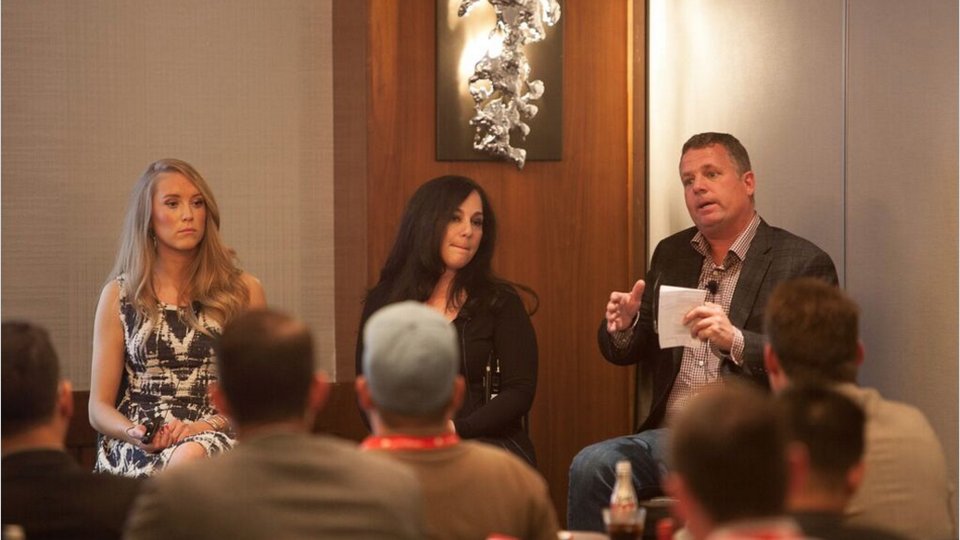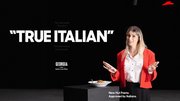Article
How Smashburger, Billy Sims BBQ, East Coast Wings get franchisees to be social
Marketers have been touting the benefits of digital marketing for years, but motivating franchisees to carve out time to learn the ropes can be difficult.

April 13, 2016 by Travis Wagoner — Editor, Networld Media Group
Marketers have been touting the benefits of digital marketing for years, but motivating franchisees to carve out time to learn the ropes can be difficult. But there are ways to inspire franchisees to become more digitally savvy.
Christine Ferris, director of public relations and social media for Smashburger; Jeff Jackson, co-founder and president of Billy Sims BBQ; Stacey Kane, chief marketing officer for East Coast Wings & Grill; and Matt Silk, head of strategy for Waterfall, discussed these issues March 30 in a session at the inaugural Restaurant Franchising & Innovation Summit at the Highlands Dallas Hotel in Dallas.
For Kane and East Coast Wings & Grill, the go-to social media platforms are Facebook, Twitter and Instagram. The chain's point-of-sale system is also of vital importance.
"With our loyalty mobile app, that customer loyalty data is integrated directly into our POS," Kane said. "We'll also soon be launching a new loyalty program and an e-club for customers. Another thing I recommend for marketing is the traffic app Waze. It has great potential as a marketer."
Ferris and Jackson use the basic social media platforms as well.
Roles and responsibilities
When it comes to allowing franchisees control over their own social media pages or having it done at the corporate level, the panelists were mixed.
"All of our franchisees have their own sites," Jackson said. "They decide how to use them."
Kane uses a mixed approach.
"Our franchisees use Moment Feed and Twitter on their own," she said. "Facebook, however, is corporate-run for consistency."
Ferris and Smashburger enlist celebrities as part of their social-media marketing.
"It's hard to maintain a brand voice on social media," she said. "Our franchise use celebrities to be that voice. One of those is Chris Pratt, who doesn't take himself too seriously. We do allow our franchisees to run their own Twitter pages, but they must be consistent. We don't allow our franchisees to have their own Facebook pages."
Wins and flops
The three panelists learned a lot about branding and social media during 2015, and shared some of their high and low points.
Jackson said that discovering "Google for Business" was a big win for Billy Sims BBQ.
"I highly recommend it," he said. "It's made our jobs much easier because everything you need is right there."
A win for Kane was utilizing an influencer marketing push by integrating Charlotte-area celebrities into the chain's marketing strategy. However, she also noted a flop.
"We rolled out catering too quickly," she said. "We wanted to capitalize on Christmas, so we rolled it out during the last week of November. We weren't ready for the volume, and we didn't have enough time to do a targeted media buy to promote it."
Ferris' win was the rollout of Smashburger's regional burger for Las Vegas. All Smashburger locations serve a burger with a taste of the flair of its region.
"For Las Vegas, we did a 'Sin City Survival Tip' campaign to promote the new 'Sin City Burger,' " Ferris said. "We used about eight celebrity influencers, and we got 15,000 survival-tip entries from people in four weeks. The 'Sin City Burger' has been our biggest limited-time offer seller."
Ferris shared that Smashburger had two flops.
"Content is king, and distribution is queen," she said. "We had great difficulty utilizing YouTube. Instagram was also a challenge. People didn't like the professionally shot photos of our food. They like to see real photos of what they'll be eating."
Crisis communications
In the digital and social media age, bad news can quickly go viral. It's paramount to use social media to communicate with people and stay on message.
"We had a credit-card breach at one of our stores in a small town," Jackson said. "The Russian mob had breached the system and stolen data on customers. Using social media, we admitted to the breach and helped people solve their problems."
Monitoring social media for crises is also important.
"You need to tell people right away if there's a crisis," Ferris said. "Make sure someone is constantly monitoring your platforms, and be transparent and truthful."
Kane learned a crisis-communication lesson during an incident she dubbed "Hamgate."
"At one of our stores in a small town we had a customer complain to a server that there was no ham on his chef salad when there should have been," she said. "The server said that there was no meat on the salad because we were being sensitive to Muslims. However, the salad contained bacon. We contacted each person who posted negative comments on social media, and told them we welcome guests of all backgrounds and religions and then sent them a picture of a chef salad with an arrow pointing to the bacon and saying 'Look! Yummy bacon!' "
Advice
The panelists concluded by offering advice learned from their experiences using digital marketing and social media.
"It's good to hear from your franchisees," Jackson said. "Listen to their ideas and figure out the best way to attack your market."
Kane advised experimenting.
"Don't be afraid to test new things," said. "But be sure to balance planning with your budget. Also, know who you are as a brand."
Ferris again emphasized transparency.
"Utilize social media to communicate with your fans and loyalists and listen to what they have to say," she said. "Also, use a listening tool to scan social media for comments and posts. Be super transparent and listen to customers, and do something with the information they give you."
About Travis Wagoner
Travis Wagoner spent nearly 18 years in education as an alumni relations and communications director, coordinating numerous annual events and writing, editing and producing a quarterly, 72-plus-page magazine. Travis also was a ghostwriter for an insurance firm, writing about the Affordable Care Act. He holds a BA degree in communications/public relations from Xavier University.
 ChatGPT
ChatGPT Grok
Grok Perplexity
Perplexity Claude
Claude








